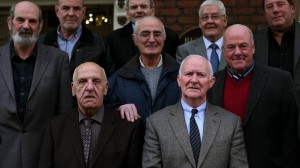THE Irish Government is to ask the European Court of Human Rights to revise its judgment in the case of the ‘Hooded Men’ who were subjected to extreme interrogation techniques in Derry in the 1970s.
Minister for Foreign Affairs Charlie Flanagan said that on the basis of new material uncovered, the Government will contend that the ill-treatment suffered by the hooded men should be recognised as torture.
The move follows a ground-breaking RTE documentary investigation into the practice – people detained in Derry were taken to Shackleton Barracks in Ballykelly were they were tortured
“The Government is aware of the suffering of the individual men and of their families, of the significance of this case, and of the weight of these allegations,” Irish Foreign Minister Charlie Flanagan said tonight.
“The archival material which underlay the RTÉ documentary was therefore taken very seriously by the Government and was subject to thorough legal analysis and advice. On the basis of the new material uncovered, it will be contended that the ill-treatment suffered by the Hooded Men should be recognised as torture.
“The Government’s decision was not taken lightly. As EU partners, UK and Ireland have worked together to promote human rights in many fora and during the original case, the UK did not contest before the European Court of Human Rights that a breach of Article 3 of the European Convention of Human rights took place.
“The British and Irish Governments have both worked hard to build stronger more trusting relations in recent years and I believe that this relationship will now stand to us as we work through the serious matters raised by these cases which have come to light in recent months.”
The European Court of Human Rights originally ruled that the treatment did not amount to torture but the men have always disputed this.
Five of the hooded men were in the High Court to hear lawyers for the Government announce what the men described as a landmark decision.
The group of men were detained by British security forces in 1971.
They had brought a legal challenge to compel the Government to apply to revise a controversial decision of the European Court in 1978.
The men were subjected to five sensory deprivation techniques; prolonged hooding, being subjected to loud noise, sleep deprivation, food and water deprivation, and being forced into stress positions.
The ECHR ruled that the techniques constituted inhuman and degrading treatment but said the evidence did not suggest the techniques constituted torture.
RTE however found the British lied.
The legal challenge came about after a programme for RTÉ’s Investigations Unit revealed that the evidence produced to the ECHR was deliberately misleading.
Amnesty International has commended the Irish Government’s decision.
Tags:






